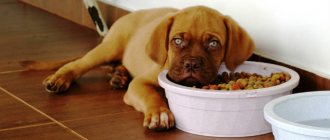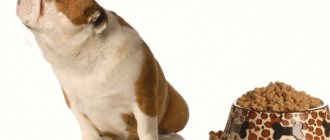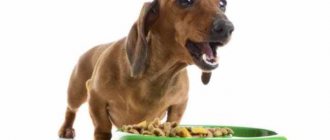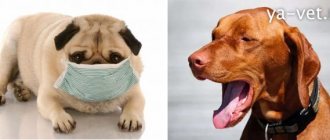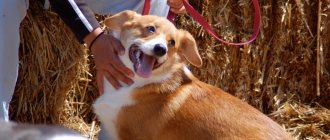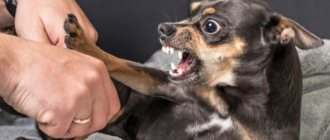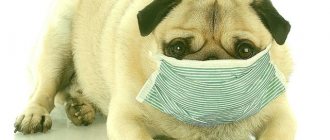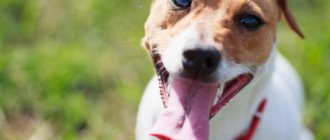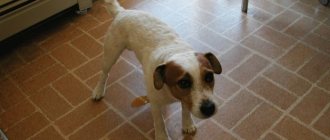If the animal becomes reluctant to eat or completely refuses to eat, this may indicate the development of the disease. However, this behavior does not always indicate a deterioration in the dog’s well-being. Many German Shepherds may not eat well but remain active and active. It is important to find out why the animal refuses to eat.
When is it normal for a dog to refuse food?
If the dog is active, but has little interest in food, this is not yet a reason to visit the veterinarian. It’s also too early to talk about a serious illness. Indifference to food is not necessarily evidence of poor health. For example, in females during the period of estrus, the appetite may decrease several times.
A cold nose is an indicator of a dog's health
The only reason for a visit to the doctor is to refuse food after the end of the cycle. Alternatively, the cause of a temporary lack of appetite in a bitch is pregnancy.
Many dogs refuse to eat when they try to feed them vitamins at the same time as food.
Important! If a dog is thin, this does not mean that he is sick with something.
If your dog is not eating well but is active, the cause of the decreased appetite may be a hot summer day. When wondering why a dog doesn’t eat well in the summer, the owner is showing his lack of awareness. The hot season is the time of infections that enter the dog’s body with food. Instinctively, the animal feels this and tries to defend itself, and from excessive portions it can vomit. This is also a kind of protection.
Dogs' appetite disappears even after introducing mineral supplements into the food that the dog has not yet tried, and after adding unfamiliar foods to the diet. For all of the above situations, a four-legged pet’s lack of appetite is the norm.
Pet examination
If the diet and amount of water are normal, have your pet examined. To begin with, the dog is supposed to determine its body temperature. Lubricate the tip of the thermometer with Vaseline oil and insert it rectally into the animal for 2 minutes. If the shepherd's body temperature rises above 38 degrees, the dog is clearly sick. An increase in body temperature in a pet does not occur due to a cold. Fever may be caused by fleas or a serious infection.
You will need to see a doctor to conduct a series of examinations to determine the exact cause of the disease. Attempting to carry out treatment on your own can lead to tragic consequences. An experienced veterinarian will prescribe treatment for your pet.
The necessary examinations can be done at the nearest veterinary hospital.
- A general blood test will show the presence of an inflammatory process in the body.
- X-ray examination of the chest and abdominal organs will help determine the presence of inflammation, tumor process, obstruction of the bronchial lumen or heart failure.
- It is permissible to examine the condition of the dog’s internal organs using ultrasound equipment.
- It is possible to conduct special biochemical tests, which will be prescribed by the doctor.
Reasons for refusing food that should not cause concern
The cat eats poorly and is losing weight: reasons, but active
Representatives of small breeds, such as Yorkies, Chihuahuas and Italian lapdogs, are very picky eaters and refuse to eat certain types of vegetables. Large and medium-sized dogs that are fed a lot and often also become picky over time.
Important! We must not forget that dogs, like people, can change their priorities with age, including gastronomic ones.
Small dogs pick at food
The dog eats little, because the animal’s tendency towards asceticism is inherent in nature. She begins to depend on food, looking at her owners and imitating them. There are other reasons explaining why a dog’s poor appetite “gets along” with physical activity:
- the dog is secretly fed by someone at home;
- The food given to the dog is not stored correctly and the smell has dissipated. In this case, it is enough to slightly warm the food in the microwave. This technique is effective for both dry and wet food;
- he is afraid of his own reflection in the plate. This happens when a familiar plastic plate is replaced with a new one made of glass or stainless steel. A dog may shy away from a vessel when it sees its reflection at the bottom;
- the dog regularly receives scraps from the owner's table, and is not interested in his own plate.
For your information! Growing up, German Shepherd and other large breed puppies often experience bouts of false hunger. A strong desire to eat suddenly gives way to a complete lack of interest in the contents of the bowl.
Possible causes of lack of appetite
Short-term loss of appetite in a dog does not require a visit to the doctor.
If an adult dog or puppy is not eating well, this does not mean that the animal is sick. This is often due to natural physiological reasons, and there is no particular cause for concern. However, if the pet does not eat, has become thin, and does not have the desire to eat at all, then you need to contact a veterinarian. To understand, it is worth considering all the possible causes of this condition.
Physiological and psychological reasons for refusing food
Temporary loss of appetite can be associated with a number of completely natural reasons. In this case, the puppy eats poorly, but is active. The pet's nose remains wet and cold, and he does not refuse treats.
Important! If the decrease in appetite is influenced by physiological factors, this condition does not last long.
A dog's appetite can directly depend on its size. Representatives of small breeds, such as Italian lapdogs, Chihuahuas, Shih Tzus, and Yorkies, are very picky when it comes to nutrition. They refuse to eat food that contains certain types of vegetables. While large and medium-sized dogs may lose their appetite if they are fed a lot and often. This may be the reason why the Alabai or German Shepherd does not eat well.
Many dogs lose their appetite temporarily after vaccination or deworming. In this case there is no cause for concern. Usually the next day after the procedure, the need for nutrition is completely restored.
Decreased appetite in growing puppies and older dogs
The reason for a dog's lack of appetite may be age-related changes in the body. At the initial stage of development, a pet experiences an increased need for a balanced diet. Decreased appetite may be associated with changing teeth. It is simply difficult for the puppy to chew dry food or regular food, as his gums hurt. At this time, you should introduce porridge into your diet.
As a dog ages, its nutritional needs also change. Such dogs are already less active and spend most of their time at rest. Therefore, a small portion per day is enough for them to feel full.
Age determines a dog's nutritional needs
Physical or nervous stress
Sometimes a dog's poor appetite can be a peculiar reaction to increased physical activity. And the reason for this is not only fatigue. During active training, the pet's body temperature rises, and the dog's brain can perceive this sign as a signal of satiety. In this case, there will be no appetite until the animal’s condition returns to normal.
Any changes in the pet’s usual way of life are stressful for him. This could be a move, the appearance of a new pet, loud noise, the death of the owner, or the puppy being separated from its mother. In such cases, the animal not only temporarily stops eating, but also looks depressed. Normalization of psychological state directly depends on the severity of stress. Sometimes it is enough to distract and pet the pet, and in some cases the help of a specialist is required.
Lack of appetite during estrus or pregnancy in female dogs
During periods of sexual activity, which occur as a result of the release of hormones, refusal to eat is the norm. Females lose their appetite two or three days before estrus, as well as on the second and third days after mating. Males also forget about nutrition at this time. But at the end of the period, the appetite is completely normalized.
A dog's refusal to eat before giving birth is also not a cause for concern. In some females, this symptom may be accompanied by occasional vomiting and loose diarrhea.
Note! If your pet begins to whine, lose consciousness, and his body temperature changes sharply, you should immediately consult a doctor.
Weather
The reason that the puppy eats little, but is still active, may be weather conditions. This mainly happens during hot weather. During such periods, the pet drinks a lot, spends most of its time in the shade and constantly wants to sleep during the day, and only comes to the plate to eat in the morning or evening.
Dogs' appetite decreases in hot weather
Pathological
But the reasons for lack of appetite are not always caused by physical or psychological factors. Sometimes this occurs as a result of an illness in the dog. The pathological cause can be identified by the accompanying symptoms.
Food poisoning
In this case, the dog does not drink or eat and begins to vomit profusely. Your pet's condition may improve or worsen over time. In the second option, lethargy appears, the pet does not get up and looks exhausted.
Note! It is important that the owner can remember what exactly the dog ate recently, and what he might have swallowed during a walk.
Viral infection
Puppies under the age of 1.5 years may develop enteritis. Initially, the dog refuses to eat and develops diarrhea, but is still active. As the virus spreads rapidly, symptoms change. The following signs appear:
- light-colored stool with green impurities;
- hard belly;
- profuse vomiting.
A sharp decrease in a dog’s appetite may also indicate the development of distemper. Symptoms appear 4-5 days after infection. During this period, the characteristic signs of the disease intensify:
- desire to be alone in a dark room;
- vomit;
- eye and nasal mucous discharge;
- yellowness on the tongue;
- body temperature 40 degrees;
- raised wool;
- apathy;
- loose stools;
- wobbly hind legs.
Intestinal obstruction of various etiologies
Often, this disease can occur when a pet swallows large tubular bones and inedible objects while playing. The disease can also develop against the background of blockage of blood vessels, helminthic infestation and organ strangulation.
Diseases of internal organs
In some cases, a dog’s refusal to eat is associated with disruption of the digestive system. Any inflammation in the intestines, stomach, or esophagus causes discomfort and pain. In this case, the unpleasant sensations intensify after eating, so the animal begins to experience fear of food.
The most common disease in dogs is gastritis.
Note! Its development can be triggered by stress, poor quality food, and lack of vitamins and minerals.
Characteristic symptoms of gastritis:
- vomit;
- weight loss;
- dull coat;
- bad breath;
- increased flatulence.
Lack of appetite and general weakness of the dog indicate the presence of a disease.
Reducing food requirements in growing puppies and older dogs
A dog has a hot nose: causes and what to do
In the first days of life and until the age of two months, the puppy should eat at least six times a day. Further, the number of feedings will depend on age:
- puppies 2–4 months old are fed 4 times a day;
- A 4 month old dog needs less food. Until the age of six months, he is supposed to eat three times a day;
- from 7 months to a year the dog will be content with two meals a day;
- From the age of one year until the end of its life, the dog only needs one feeding.
As the dog ages, the owner changes the composition of his diet and reduces the number of servings.
Feeding a two-month-old puppy should be strictly on schedule
How to increase your dog's appetite
My dog has a bad appetite, what should I do? You can improve it if you follow simple recommendations:
- If the dog has not finished the food, then you need to hide it, and after 4-5 hours, warm it up to room temperature and feed the pet again.
- Treats should not be given between main meals.
- The water in the drinking bowl needs to be changed once a day.
- Feed should be given at the same time to develop a routine.
- Do not mix dry food and natural food.
- During the period of tooth replacement, you need to switch your pet to soft cereals and liquid food.
- You should praise your pet more often and surround it with care.
If these rules are followed, the dog’s appetite will be restored within 1-2 weeks.
Additional reasons why your dog won't eat
One of the main reasons why a dog refuses to eat is overfeeding. First of all, excessive nutrition is dangerous for active dogs, who immediately after eating begin to run and jump.
The dog does not eat dry food: what to do if it did before
For example, by overfeeding a German shepherd, the owner risks rewarding his ward with at least obesity and atherosclerosis. In the worst case, the shepherd, being prone to gastric volvulus (in this breed, the stomach is too mobile and can twist or shift during moments of activity), may die.
Representatives of some breeds are strictly prohibited from feeding mixed food. Instinctively, the dog feels that there is unacceptable food in his bowl and does not want to eat it. An incorrectly selected diet and excessive portions will sooner or later result in a malfunction of the gastrointestinal tract.
Note! There are breeds of dogs (for example, huskies) that, given their excessive activity, can only be fed after a walk. At first, the dog may refuse to follow the wrong regime until hunger takes its toll. If a husky goes for a walk after eating, he is guaranteed to have a volvulus.
The puppy eats poorly: what should the breeder do?
Puppies may experience problems with appetite during the teething period. In this situation, it is necessary to completely exclude warm and hard foods from the diet, replacing them with cool and soft foods. If your puppy is not eating well, his refusal to eat may be due to:
- stress, the cause of which in most cases is separation from the mother. In addition, if the situation at the old place of residence was calm, and there are children in the new house, the unusually noisy company will initially worry the baby. A stressful situation can arise due to intimidation of a newcomer by old-timers - other pets. Having adapted to new living conditions, the puppy will again begin to eat food as usual;
- digestive infection. The puppy's intestines are easily invaded by parasites, such as intestinal worms or bacteria;
- the habit of carrying around tidbits that are not intended for puppies. Having treated himself to food that is unacceptable to him, the dog runs the risk of getting a digestive tract disorder.
A puppy's lack of appetite is not a reason to panic.
Ways to increase your four-legged friend's appetite
Man's four-legged friends, like man himself, sometimes become capricious and refuse to eat boring food. A few tips will help you get everything back to normal:
- Sometimes limiting the number of treats is enough to increase a dog's appetite. As a rule, they are given to the dog between meals;
- reluctance to eat may be a consequence of lack of physical activity. Regular exercise stimulates appetite;
- Often, refusal to eat is the result of a lack of discipline. If the dog is spoiled and is used to getting food whenever it wants, the owners should think about creating a schedule for dispensing food. The bowl of food is set out for 15 minutes, and after this time it is hidden, even if the food is not touched. Gradually, the dog will learn: if he has not eaten, he will have to starve until the next food distribution;
- in some cases, the problem is solved by reducing the portion by 10%.
There are a few tricks to increase your dog's appetite.
For your information! You can increase your four-legged friend's appetite by adding special sauces for seasoning dog food.
What not to do if your dog misses a feeding
It is strictly forbidden to run after a dog with a plate, persuading him to eat at least a little. The dog must learn that if he refuses food now, he will only be able to eat during the next scheduled feeding, otherwise he will go to bed hungry.
Dog handlers do not advise making concessions to a puppy who does not want to eat. When the dog grows up, he will not be able to eat without coaxing, even when he is hungry. The main indicators of health in puppies are a wet nose and curiosity. Refusal to eat may be the result of overfeeding.
Diagnosis of diseases
Refusal to feed accompanied by lethargy is a reason to immediately consult a veterinarian. To make an accurate diagnosis, the following series of necessary tests are performed:
- general clinical analysis of blood and urine;
- blood chemistry;
- scraping and taking biological fluids for bacterial inoculation on nutrient media;
- ultrasound diagnostics.
In controversial cases, X-ray examination and endoscopy are prescribed to confirm the preliminary diagnosis.
In what cases is it necessary to contact a veterinarian?
A good reason to visit a veterinarian is an animal’s lack of appetite for no apparent reason. The owner of the dog should ensure that during the appointment the veterinarian weighs the dog and tells him what weight, in his opinion, is optimal and what ways to maintain it.
Important ! Lethargy, loss of appetite and yellowing of the eyeballs are likely signs of a viral infection, such as distemper. Symptoms of the same kind may indicate liver and heart diseases.
If a dog who refuses to eat looks tired, has a rumbling stomach or is swollen, this may indicate the presence of worms. In any case, the final diagnosis will be made by the doctor.
Lack of appetite is often observed in dogs that have to live in conditions unsuitable for this species. For example, a breeder of Central Asian Shepherds, trying to find out why the Alabai is not eating well, should turn not to a veterinarian, but to a dog handler.
If your dog refuses to eat for a long time, you should urgently visit a veterinarian.
Thus, poor appetite is not yet a reason to run to the clinic with your pet. He needs to be watched. Perhaps such behavior is simply a riot on the ship due to boring food. But if the dog does not eat for several days, it has become lethargic, then you should not postpone a visit to the doctor, as there is a risk of a viral disease, which can still be cured at an early stage.
